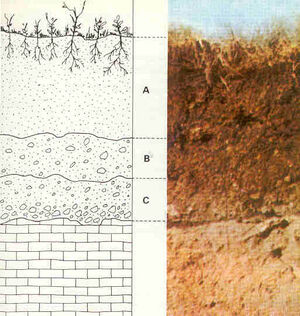Soil (nonfiction): Difference between revisions
Jump to navigation
Jump to search
No edit summary |
|||
| (2 intermediate revisions by the same user not shown) | |||
| Line 1: | Line 1: | ||
'''Soil''' is a mixture of minerals, organic matter, gases, liquids, and countless organisms that together support life on Earth. | [[File:Soil_diagram.jpg|thumb|A represents soil; B represents laterite, a regolith; C represents saprolite, a less-weathered regolith; the bottom-most layer represents bedrock.]]'''Soil''' is a mixture of minerals, organic matter, gases, liquids, and countless organisms that together support life on Earth. | ||
Soil is a natural body called the pedosphere which has four important functions: it is a medium for plant growth; it is a means of water storage, supply and purification; it is a modifier of Earth's atmosphere; it is a habitat for organisms; all of which, in turn, modify the soil. | Soil is a natural body called the pedosphere which has four important functions: it is a medium for plant growth; it is a means of water storage, supply and purification; it is a modifier of Earth's atmosphere; it is a habitat for organisms; all of which, in turn, modify the soil. | ||
| Line 7: | Line 5: | ||
Soil is called the "Skin of the Earth" and interfaces with its lithosphere, hydrosphere, atmosphere, and biosphere. | Soil is called the "Skin of the Earth" and interfaces with its lithosphere, hydrosphere, atmosphere, and biosphere. | ||
== In the News == | |||
<gallery mode="traditional"> | |||
</gallery> | |||
== Fiction cross-reference == | |||
== | |||
== Nonfiction cross-reference == | == Nonfiction cross-reference == | ||
* [[Diagramaceous soil]] | * [[Diagramaceous soil]] | ||
External links: | |||
* [https://en.wikipedia.org/wiki/Soil Soil] @ Wikipedia | * [https://en.wikipedia.org/wiki/Soil Soil] @ Wikipedia | ||
Latest revision as of 17:40, 24 June 2016
Soil is a mixture of minerals, organic matter, gases, liquids, and countless organisms that together support life on Earth.
Soil is a natural body called the pedosphere which has four important functions: it is a medium for plant growth; it is a means of water storage, supply and purification; it is a modifier of Earth's atmosphere; it is a habitat for organisms; all of which, in turn, modify the soil.
Soil is called the "Skin of the Earth" and interfaces with its lithosphere, hydrosphere, atmosphere, and biosphere.
In the News
Fiction cross-reference
Nonfiction cross-reference
External links:
- Soil @ Wikipedia
